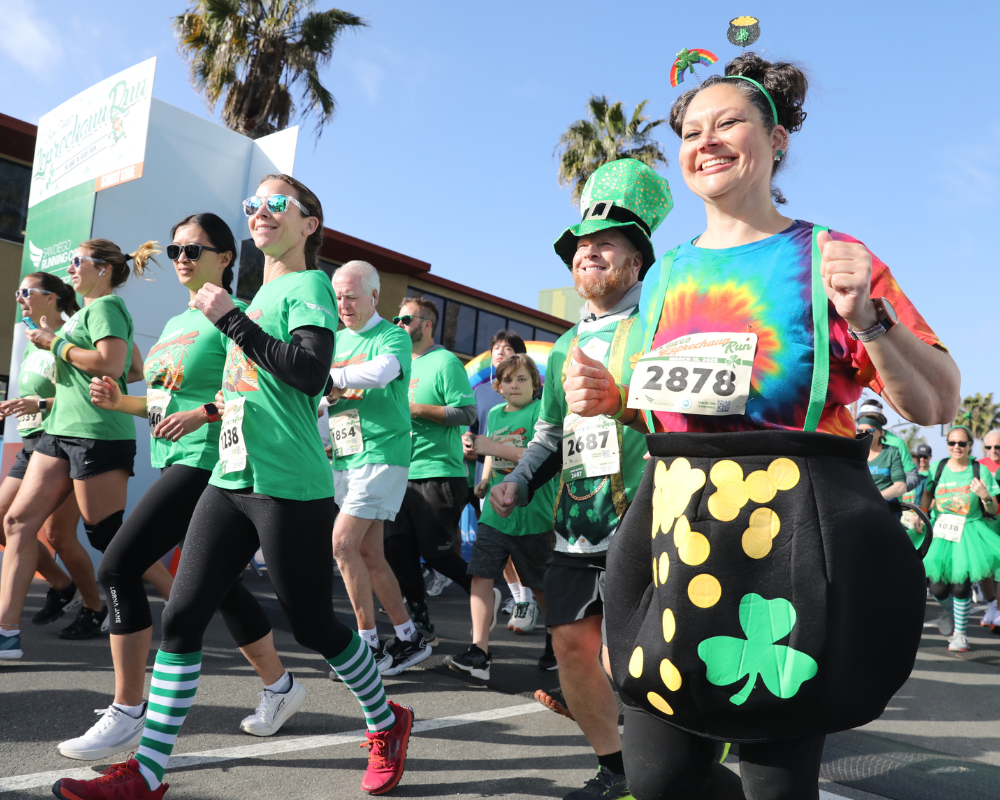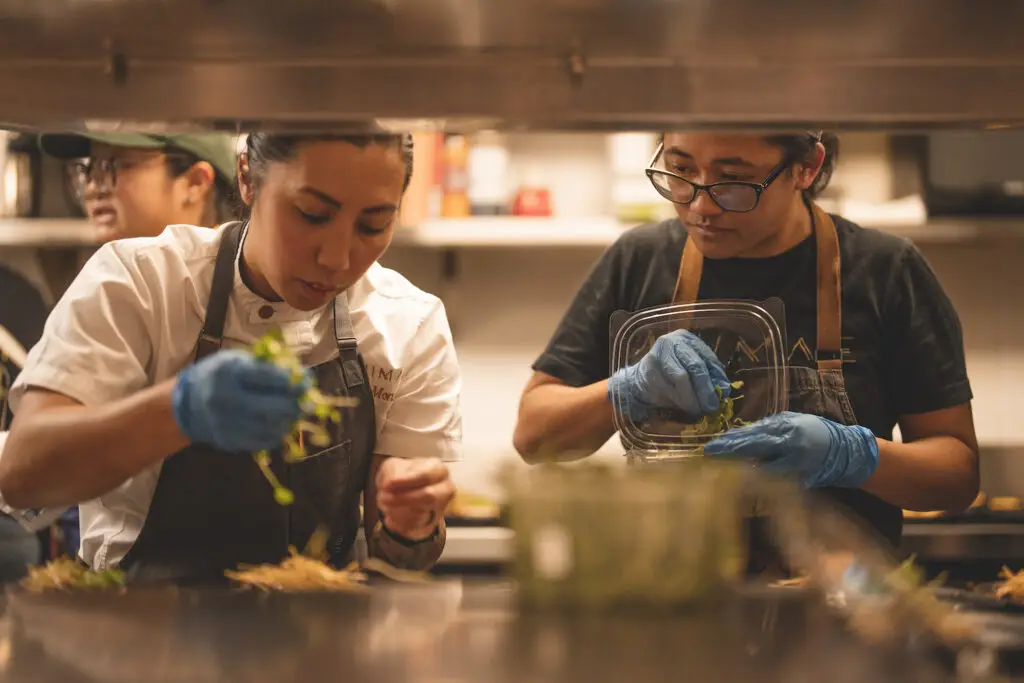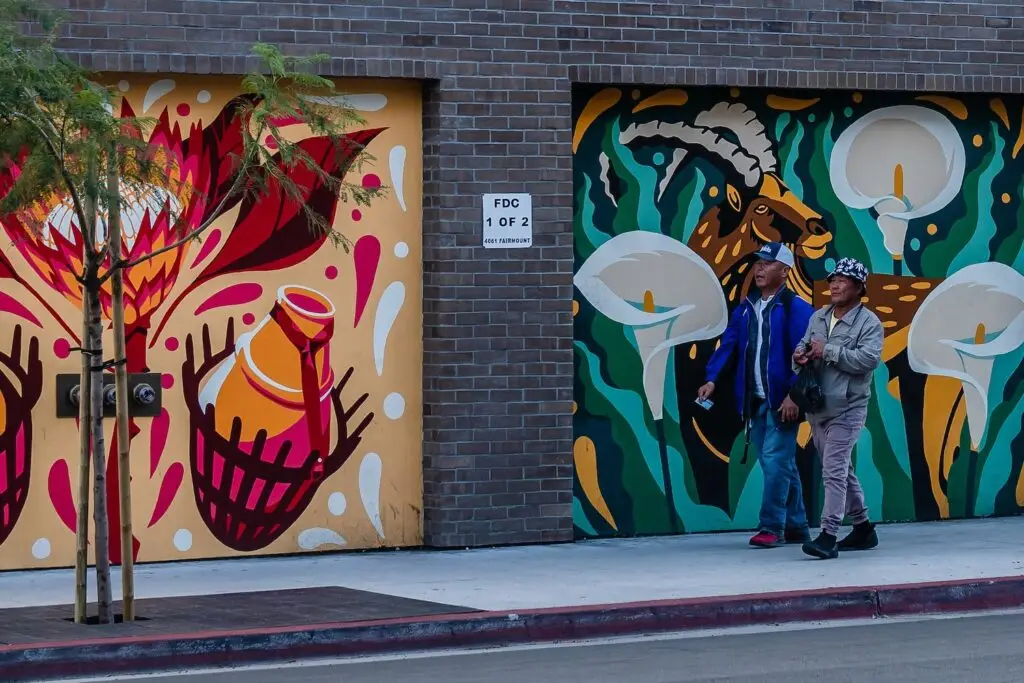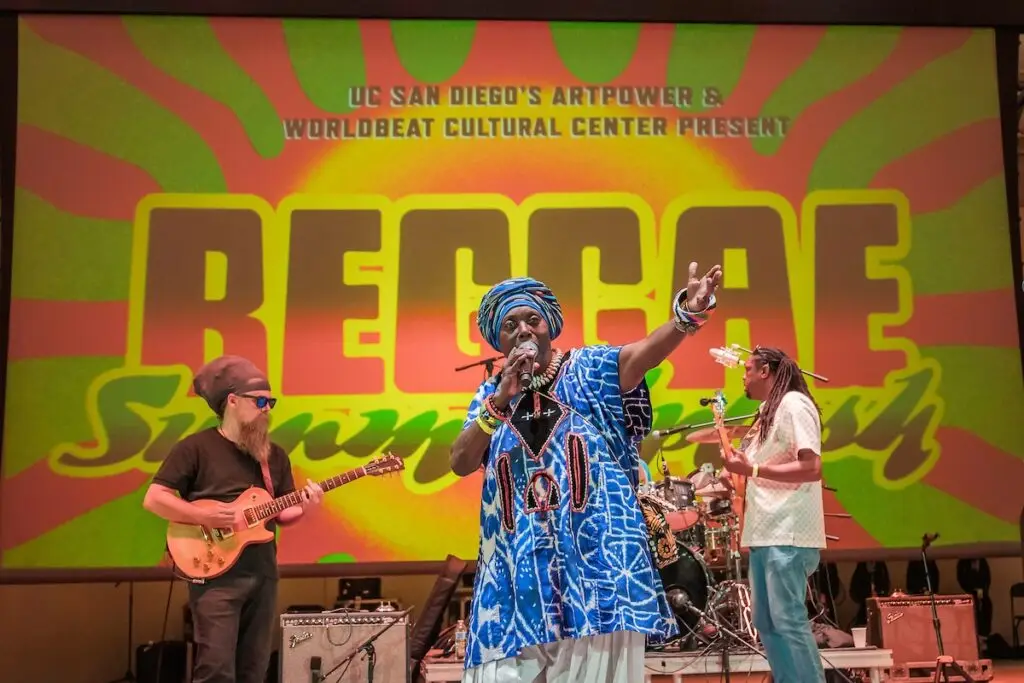
San Diego
Photo by John Bahu
Demographic studies predict that by 2060 Latinos will be the majority ethnic group in California, and already, in the last federal election, polling data shows Latino voters made a difference in key swing states. It’s no wonder both political parties realize not only the importance of connecting to Latino voters, but the necessity of it. Locally, one candidate for mayor (who is not Latino) even chose to announce his candidacy in Spanish. And it’s not just politics. It seems everyone from Google to the San Diego Padres to IKEA to this very magazine has an initiative focused on “reaching the Latino market.”
To say Latinos as a group are sought-after is an understatement. Perhaps the only bigger understatement is to say they are, as a group, unanimous. It’s that fact that prompted us to do this story. San Diego Magazine partnered with KPBS and recruited UC San Diego researcher Tom K. Wong to help us conduct a survey of Latinos in San Diego. He’s an expert on immigration issues, too.
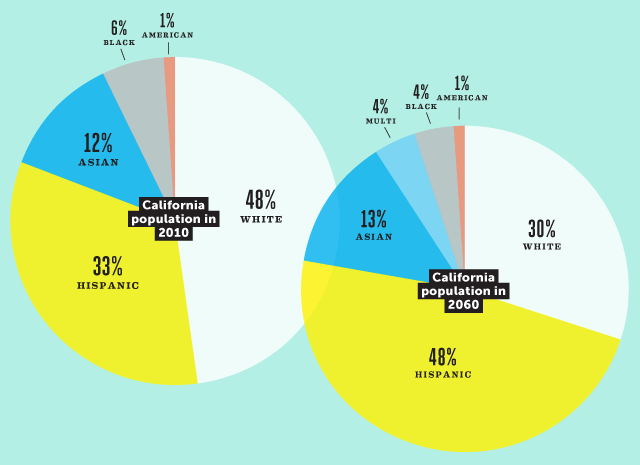
Population pie chart
Because whether it’s supporting a sports team, voting for a candidate, attending a university, or buying a magazine, reaching a sought-after group of people is only possible when you start with more listening and less talking.
After poring over the data, we learned many things. For starters, some prefer not to be called “Latino” at all. Of course, the most striking thing we ended up with after a 75-question survey is more questions. We hope to continue the conversation throughout the year. But for now, here’s to a trek up the learning curve and getting to know our neighbors.
Read more about the survey and Tom K. Wong
To listen to an interview with the researcher on KPBS, click here.
THE LATINO EXPERIENCE
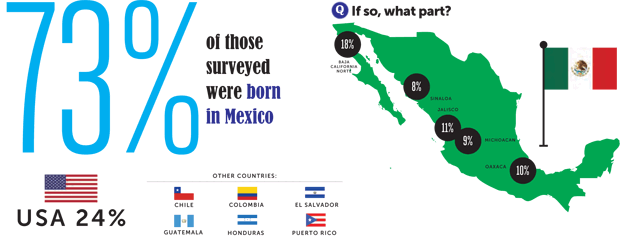
Born in Mexico graphic
laurieg
50% said it was very important for them to change so that they blend in better to American society
Digging Deeper: “The experience of Latinos in San Diego continues to be a complex and evolving one. For example, in response to the question of how important is it to change in order to blend in, 50% feel that it’s very important, which is significantly higher than the response to the same question in a national survey. This doesn’t necessarily translate into being “more American” and “less Latino.” In fact, among those who feel that it’s very important to blend in, while 61% say that being American is very or extremely important to their identity, 69% feel the same way about their Latino identity. San Diego’s Latino population thus reflects what it means to be a multicultural American.” -Tom K. Wong, Assistant Professor, UC San Diego
Education:
have attended some level of college or beyond
have less than an 8th grade education
28%
31%
Employement:
Full-time
homemaker
part-time
retired
student
33%
27%
14%
11%
5%
Q. Do you prefer to be called “Hispanic” or “Latino?”
Hispanic
Latino
No Preference:
25%
17%
58%
Q. How important is being Latino or Hispanic to your identity?
extremely important
very important
moderately important
a little important
not important at all
14%
45%
19%
9%
9%
Q. How important is being American to your identity?
extremely important
very important
moderately important
a little important
not important at all
13%
34%
21%
10%
16%
Family Life
are currently married
have children
55%
82%
Q. How would you describe the average Latino?

How would you describe the average Latino word map
laurieg
CLICK HERE TO READ MORE ABOUT THE SURVEY AND HOW THESE RESPONSES WERE GENERATED)
Q. How do you think the average San Diegan would describe the average Hispanic?
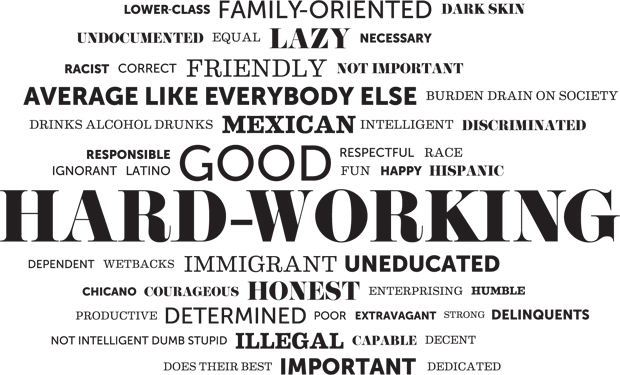
How do you think the average San Diegan would describe the average Hispanic word map
laurieg
CLICK HERE TO READ MORE ABOUT THE SURVEY AND HOW THESE RESPONSES WERE GENERATED)
Let’s Talk:
Recalled having a conversation in English with someone who spoke louder or slower, because he or she assumed they didn’t speak English
45%
Said they generally speak more Spanish than English in their day-to-day lives
47%
Said yes, they have been called an immigrant, regardless of whether the person knew their background
31%
Said they have been called “illegals,” regardless of whether the person knew their
24.5%
Q. How much discrimination is there in San Diego?
A great deal
a lot
a moderate amount
a little
none at all
20%
15%
29%
26%
7%
POLITICALLY SPEAKING
Q. Do you follow what’s going on in government and public affairs?
31% said yes
Q. Do you think of yourself as being closer to the Democratic or Republican Party?
Domacratic Party
Republican Party
Don’t Know
33%
15%
34%
Digging Deeper: “Almost everyone who follows politics has heard about the rising political influence of Latinos. Last November, an estimated 71% of Latino voters voted for President Obama, and our survey reflects this. But the future of Latino politics in San Diego is not set in stone. While Democrats greatly outnumber Republicans in our survey, 35% of respondents think of themselves as Independents or as “Other” (the remainder responded don’t know or declined to state). This 35% is up for grabs politically in that many are unsure whether they feel closer to the Democratic or Republican Party. One thing, however, does seem certain. While 68% said that they would not vote for or support a political candidate simply because that person was Latino, 76% said that they would not support a candidate or party that was viewed as being anti-immigrant.” -Tom K. Wong, Assistant Professor, UC San Diego
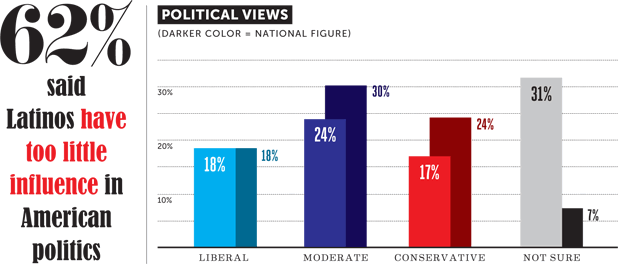
Political views graph
laurieg
The Issues
Favor raising taxes on people making more than $1 million per year
64%
Favor a lot or a great deal of government regulation
30%
Oppose legalizing medical marijuana
59%
Think abortion should be legal only in cases of rape, incest, or when the mother’s health is at stake
31%
Believe there should be no legal recognition of same-sex marriage
33%
Support or strongly support the Affordable Care Act, also known as Obamacare
72%
73% voted for Obama
71% nationally
9% voted for Romney
27% nationally
63% Did NOT vote in the last November election*
*Figure appears higher because this question was asked to both registered and unregistered voters.
58% said they pay close attention to the changing role and growing influence of Latinos in politics
68% said they would not vote for a Latino candidate if they disagreed with him or her on important issues
76% would not support a political candidate who is viewed as anti-immigrant
2x more Latinos feel more distance from the Republican Party than the Democratic Party based on the parties’ positions on immigration
SAN DIEGO IS HOME
Q. Over the past year, have you considered or taken steps to move out of the San Diego area?
91% said now
79% said San Diego is the place where they think their family could have the best life
81% think it’s either somewhat likely or very likely that they will improve their standard of living here in the next 10 years
Q. What would you say is the best part of living in the San Diego area?

Best parts about living in San Diego
12% think San Diego is already a diverse and integrated place
Digging Deeper: “We threw out a softball question regarding diversity. Surprisingly, only 12% answered, “San Diego is already one of the most diverse and integrated places in the U.S.” An overwhelming number, 70%, said that life here would be better if the area was more integrated, and 89% feel there is some level of discrimination against Latinos in San Diego. When it comes to day-to-day interactions with others, 25% have been called “illegal,” 47% of those who speak little to no Spanish have been stereotyped as not knowing English, and 75% of those in our survey who weren’t born in Mexico have been stereotyped as “Mexican.” Thus, while San Diego is one of the most diverse places in the country, these results show that we have much further to go when it comes to becoming a more integrated community.” -Tom K. Wong, Assistant Professor, UC San Diego
95% think immigrants today strengthen our country because of their hard work and talents
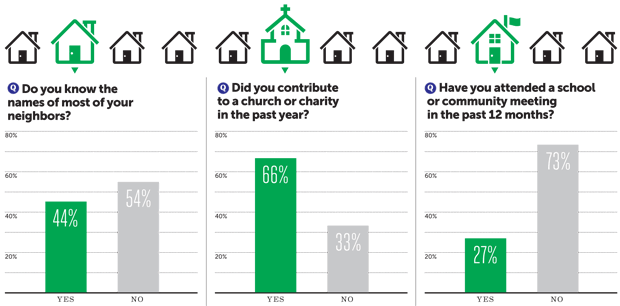
Best parts about living in San Diego
laurieg
77% said they have access to public services in Spanish
What grade would you give your community’s…
A |
B |
C |
D |
F |
|
| Roads and transportation services | 34% | 33% | 15% | 9% | 6% |
| Police | 38% | 31% | 17% | 4% | 7% |
| Public schools | 32% | 35% | 15% | 7% | 8% |
| Public services | 24% | 40% | 21% | 5% | 6% |
62% eat dinner with family at least 5 days per week
Q. During the past 12 months, did you attend an arts or cultural festival in San Diego?
36% said yes
Q. If you were mayor, what would be the first thing you would change about San Diego?
1. Give small business a bigger voice
2. Lower the cost of living
3. Fix the streets
4. Fix education
5. Raise minimum wage
About the survey:
All responses were based on a survey conducted of 400 Latinos in San Diego via telephone. All respondents were over the age of 18 and residing in San Diego County zip codes. The survey was written by Tom K. Wong (his bio is below), a published researcher and professor on the politics of identity and immigration, in partnership with KPBS and San Diego Magazine. The survey was conducted in English and in Spanish (depending on the respondents preference) over two weeks in September 2013 by Americas Survey Company. The data reflects a 5% margin of error.
We presented both quantitative and qualitative survey responses in the story in the November issue in many graphic formats, including word clouds. The two word clouds were comprised of the answers to the following open-ended questions, meaning we asked respondents to respond in their own words. We did not supply any of the words shown in the word clouds or suggest them in any way. We included the following two questions in the survey, in the following order, among 75 other questions:
In 3 words, how would you describe the average Latino?
In 3 words, how do you think the average San Diegan would describe the average Latino?
We presented the responses we received in the word cloud, with the size of each word determined by how often that specific word was given by one of the 400 respondents. Word clouds were created using wordle.net and adapted visually with San Diego Magazine fonts.
The survey was conducted in partnership with KPBS. Click here to see coverage of the results on KPBS radio and television programs, beginning November 13, 2013.
More about Tom K. Wong:
Wong is an assistant professor of political science at the University of California, San Diego. Professor Wong’s research focuses on the politics of immigration, citizenship, and migrant “illegality.” As these issues have far-reaching implications, his work also explores the links between immigration, race and ethnicity, and the politics of identity. He is the creator of the CIR 2013 Blog (http://ccis.ucsd.edu/cir2013/), which predicts support and opposition to comprehensive immigration reform among all 535 current members of Congress. He is the lead researcher on one of the first nationwide surveys of undocumented youth. He also recently completed a book manuscript, which analyzes the immigration control policies of twenty-five Western immigrant-receiving democracies (Stanford University Press), and is beginning another book on the politics of comprehensive immigration reform in the U.S. (Oxford University Press), among other projects. Wong’s research has been used by policymakers both in the U.S. and in Mexico, as well as by organizations that serve immigrant communities. Wong and his work has been covered by ABC News/Univision, Fusion, NPR, the New York Times, the Los Angeles Times, Yahoo News, and by Univision in Mexico. His most recent publication is the first nationwide analysis of the Obama administration’s policy of Deferred Action for Childhood Arrivals (DACA), which provides relief from deportation for undocumented youth. The report can be found here: http://www.americanprogress.org/issues/immigration/report/2013/09/20/74599/undocumented-no-more/.
Read our post-survey Q&A with Wong here.
PARTNER CONTENT

